The arrival of the COVID-19 pandemic to the world has brought with it many changes to the way we work. As offices, co-working spaces and other workspaces began to close down across the world, many companies switched to remote working models.
A survey conducted by Slack revealed that approximately 16 million U.S. workers began working remotely starting March 27 of this year.
Although lockdown restrictions are now easing up, for those companies that were not already remote before this shift began, the change has prompted some, such as Twitter, to permanently change their work patterns and allow employees to work from home “forever.” Other startups are opting for a more hybrid model that mixes remote and office working.
While this experience has been challenging for some startups — many of which were in the initial stages of business when it began — most ecosystem players agree that they have learnt valuable lessons about the new workplace reality, which has been aptly dubbed the “remote revolution.”
PitchMe
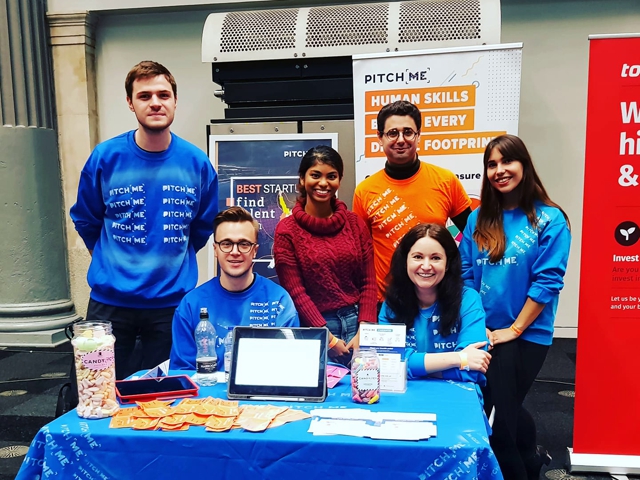
CEO of UK talent marketplace PitchMe Dina Bayasanova believes that her company’s tool will help businesses across the world prepare for the remote revolution.
Just because companies are shifting the way they work, doesn’t mean they have stopped hiring, Bayasanova explained. The only change is that companies are, by default, “now hiring from diverse locations across the world,” she told The Sociable.
The economic impacts of COVID-19 have disproportionately affected particular sectors, such as hospitality, recruitment, and the service industry, leaving lots of people unemployed. Bayasanova refers to these people as “career shifters,” or, those with a particular level of seniority in one industry who have been forced to break into another because of the circumstances.
“Those people are lacking tools,” she said, explaining how they are more than just their CVs, which “limit a person’s ability to search for a job” and “puts people into boxes.”
Instead, PitchMe pulls information about candidates who are looking to apply for jobs, and creates them a digital profile showing a snapshot of skills, knowledge and ability, for them to use instead of the traditional CV method.
By using PitchMe’s profiling tool, applicants can represent themselves in a broader manner, increasing both their chances of being hired and companies’ chances of filling important positions amid social distancing restrictions.
WayDev
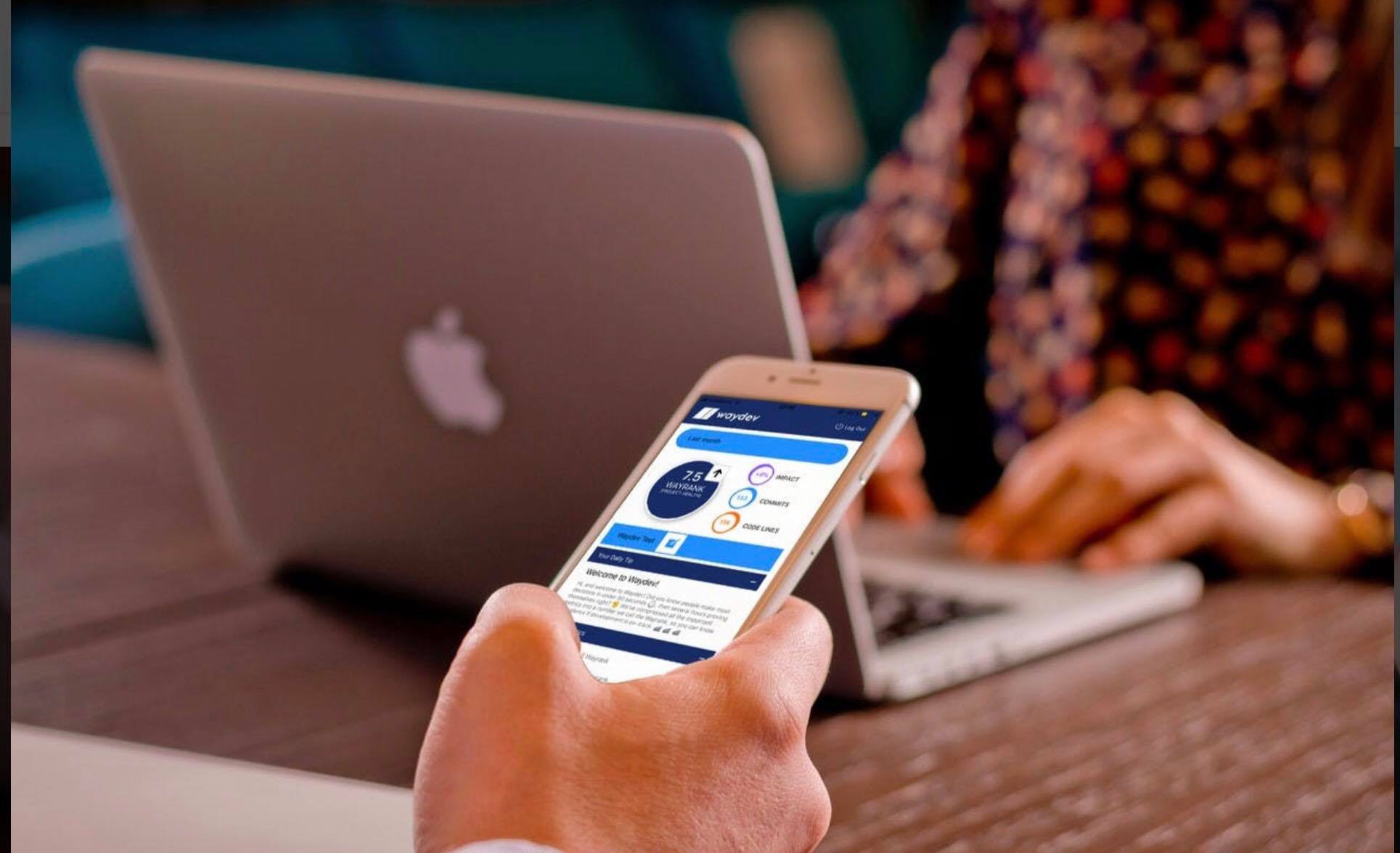
San Francisco-based analytics platform WayDev offers a tool to help with remote project management for software development teams spread across the world.
Using a Git distributed version-control system, WayDev helps project managers monitor the progress of their work over time, check their team members’ performance, detect and eliminate project bottlenecks in advance, celebrate their team’s achievements and highlight team members who deserve highlighting.
Now that remote working is no longer a money-saving option but instead the new norm, it can be difficult for managers to monitor their team’s success and ensure that career progression opportunities are recognized. Using WayDev, however, startups can understand remote teams’ productivity and adjust their strategies accordingly.
Talview

During lockdown, Talview, a candidate experience platform for interviewing and testing students, repurposed its tool to help those working in the education sector approach the remote revolution.
Thanks to the extra hours the team put in, Talview is now helping universities in the US, Singapore and India to conduct remote applications. For education institutions that have continued examining their students, Talview has a suite of services to invigilate online assessments and ensure the integrity of results.
In order to keep its team on top of the increase in activity, Talview launched its own Covid-19 response plan to work on priorities without distractions or delays. Daily stand-up calls have also been critical for keeping everyone on the same page, as have new dashboards for tracking important metrics.
For the team, adjusting to almost six months of remote work when they were used to working in office spaces has not been easy, but small changes such as a Slack channel for sharing happy moments, virtual coffee breaks, virtual Power Yoga and Zumba classes for all employees and one-to-one check-ins have kept morale up.
“We are doing everything in our power to maintain and grow the culture at Talview,” CEO Sanjoe Tom Jose told The Sociable. “Our core values…stand for Collaboration, Credence, Commitment to Excellence, and Customer Centricity.”
Auquan
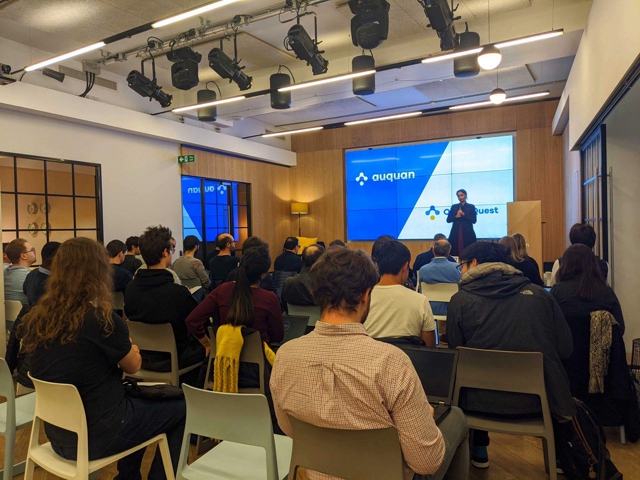
Although data science platform Auquan is not actively working to help companies approach the remote revolution, the team feels well prepared for a permanent shift towards a mixture of office and remote work as employees were already geographically distributed and worked using an entirely cloud-based technology system before the pandemic.
Despite having to put their pre-pandemic office moves on hold in both the UK and India, as well as dealing with unstable internet connections and the inability to whiteboard ideas during lockdown, Head of Users David Ardagh claims he is “really proud of how the team has doubled down and have maintained [a] high rate of execution.”
“People’s mental health is a priority…and for things like loneliness and difficulty sleeping it’s important to realize that we all went through similar difficulties,” Ardagh told The Sociable. “During periods of lockdown it was easy for people to feel more isolated than they normally would.”
Thankfully, the company has been able to accommodate other commitments during the remote shift, and daily stand-ups as well as end of day handoffs have served as useful forms of keeping up communication within the team. On Friday afternoons, they play games such as mafia, Codenames and Scattergories.
“We take fortnightly pulse surveys, asking how people are feeling about the company, the culture and themselves,” said Ardagh.
Obie
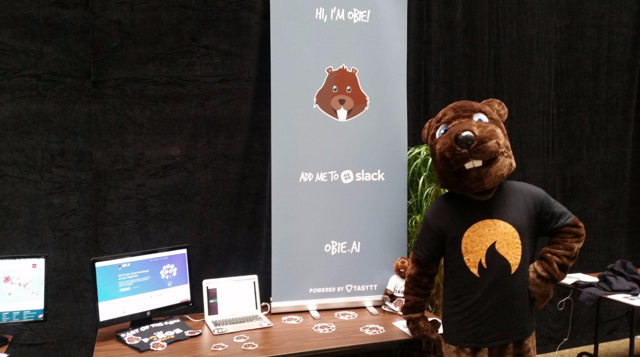
Knowledge base software and support accelerator Obie is another startup that is well-positioned to help companies prepare for the remote revolution.
By enabling companies to bring all their knowledge and documentation into one single platform, Obie’s tools increase workplace productivity by saving time and providing knowledge instantly.
“The pandemic accelerated the need for the use of these [workplace productivity] tools,” CEO Chris Buttenham explained.
However, the remote working shift has also meant that the demand for these tools has made them difficult to procure at the moment, which is why over lockdown Obie has focused on democratizing access to them.
“Obie personal” is a browser extension that users can download for free so that they can improve productivity on their own.
Describing remote working as something modern organizations “have to have a muscle for,” Buttenham claims the remote revolution is simply a “natural progression” of our working lives.
Having learnt to flex the remote working muscle just before the pandemic, the Obie team has managed to stay connected via daily standups and bi-weekly sprint planning meetings throughout lockdown.
Talos
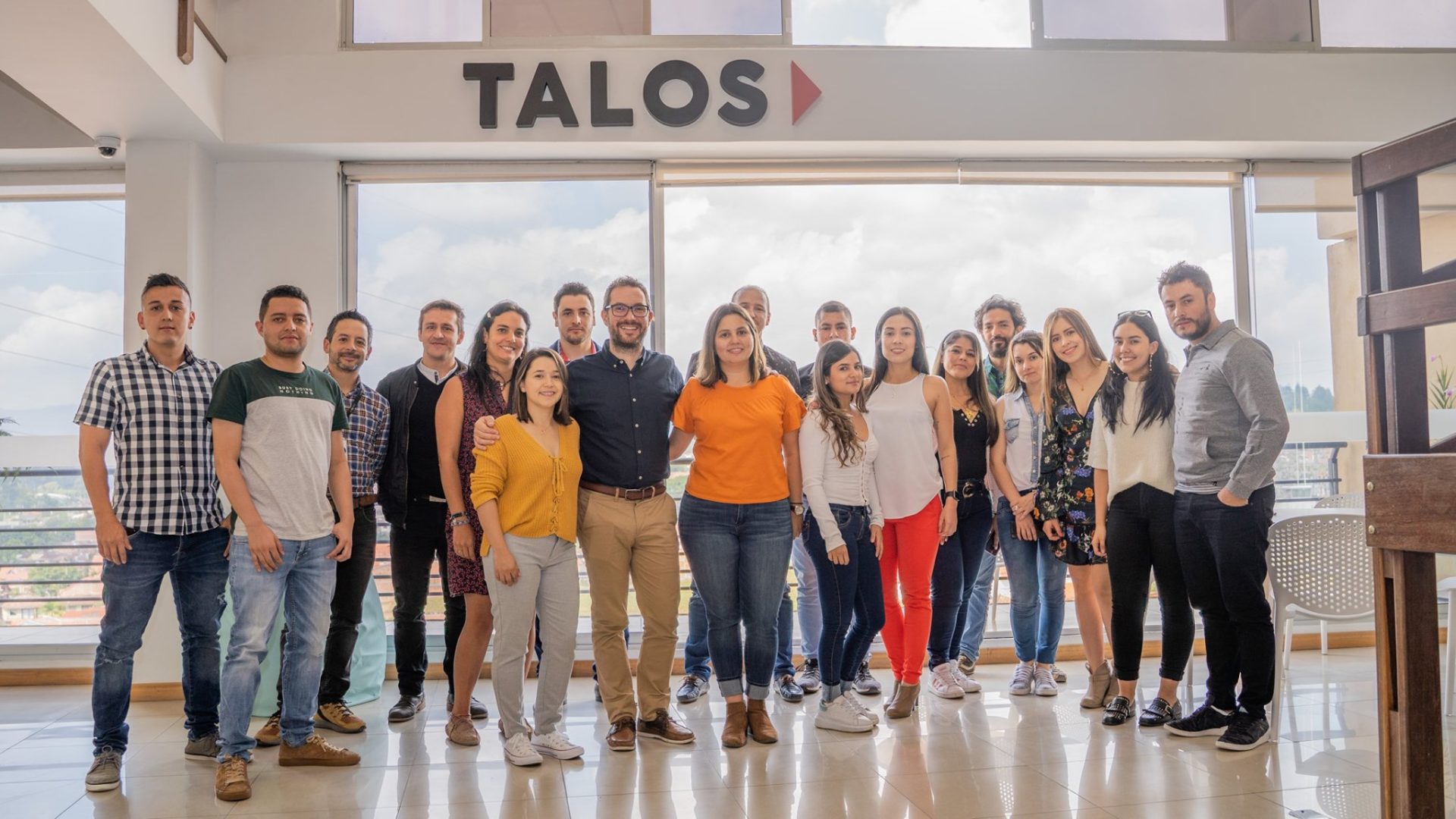
Software development and e-commerce solutions company Talos has experienced an increased focus on their industry from the startup ecosystem as it has shifted to remote work during lockdown.
The company’s teams — which were already distributed internationally across Colombia, Canada and the U.S before the pandemic — have watched their offices temporarily close and employees have shifted to an entirely remote working model, even though Talos did offer remote working days before the pandemic.
In response to this change, Talos has increased work groups and project teams to facilitate greater communication, restructured programs, and placed a focus on employee wellbeing. Workouts, coffee breaks and “beer Friday,” still exist, but have just moved online, Gautam Daswani, Talos’ Director of Luxury Business Development, told The Sociable.
Counseling sessions and leadership talks, which are also a focus for Talos, have also moved online.
“The pandemic affected our teams with heightened stress levels, increased worry about family and friends and overall concern about whats going to happen next,” said Daswani.
Despite this, the teams at Talos remain busy, Daswani added, and they continue to concentrate on keeping pipelines full.
The I.V. Doc

The shift to a remote working model has barely affected mobile I.V. treatment and wellness solutions company The I.V. Doc, as the startup was delivering treatments to its clients remotely even before the pandemic.
While the demand for their I.V. drip service decreased, and the team was forced to pause all home treatments at the start of lockdown, the remote working shift prompted this startup to start offering an entirely different product: a COVID-19 testing service.
For their average clientele — 30-40 year-old professional workers — who were looking to test themselves for the virus while working remotely, this new service has created a new stream of revenue for the company.
Some clients also made the most of the opportunity to receive an I.V. boost for their immune system, Ajala Ngarndi, Medical Director of the I.V. Doc told The Sociable.
As patients continue to avoid hospitals due to the potential risks of COVID-19 contagion, the startup’s quick 72-hour turnaround time on PCR testing is proving popular among its customers.
Ngarndi hopes the remote revolution will continue to increase the demand for the I.V. Doc’s at-home wellness services.
Aikon Labs

Aikon Labs is a startup that provides tech solutions that enable workers to consolidate relevant data in workplace communication systems, a service that Nitesh Dudhia, the startup’s co-founder, believes is in even more demand because of the remote working shift over lockdown.
Now that co-workers no longer have the option to quickly shout across the office, they are naturally more dependent on digital communication systems, which enable them to continue sharing information without having to be in a call at exactly the same time, Dudhia explained.
For Aikon Labs, this change has been “great,” and the team has been taking advantage of this marketing boost for the business.
Although Aikon Labs has had to part with its physical office space because of lockdown, the now remote-first approach opens up a wealth of hiring opportunities.
“Now we’ve got access to talent in different places and in remote towns,” said Dudhia.
And despite the circumstances, the small team of 15 people has worked well remotely, adopting a more productive and collaborative approach, Dudhia said.
“Everyone has met the other person halfway.”
Tandem
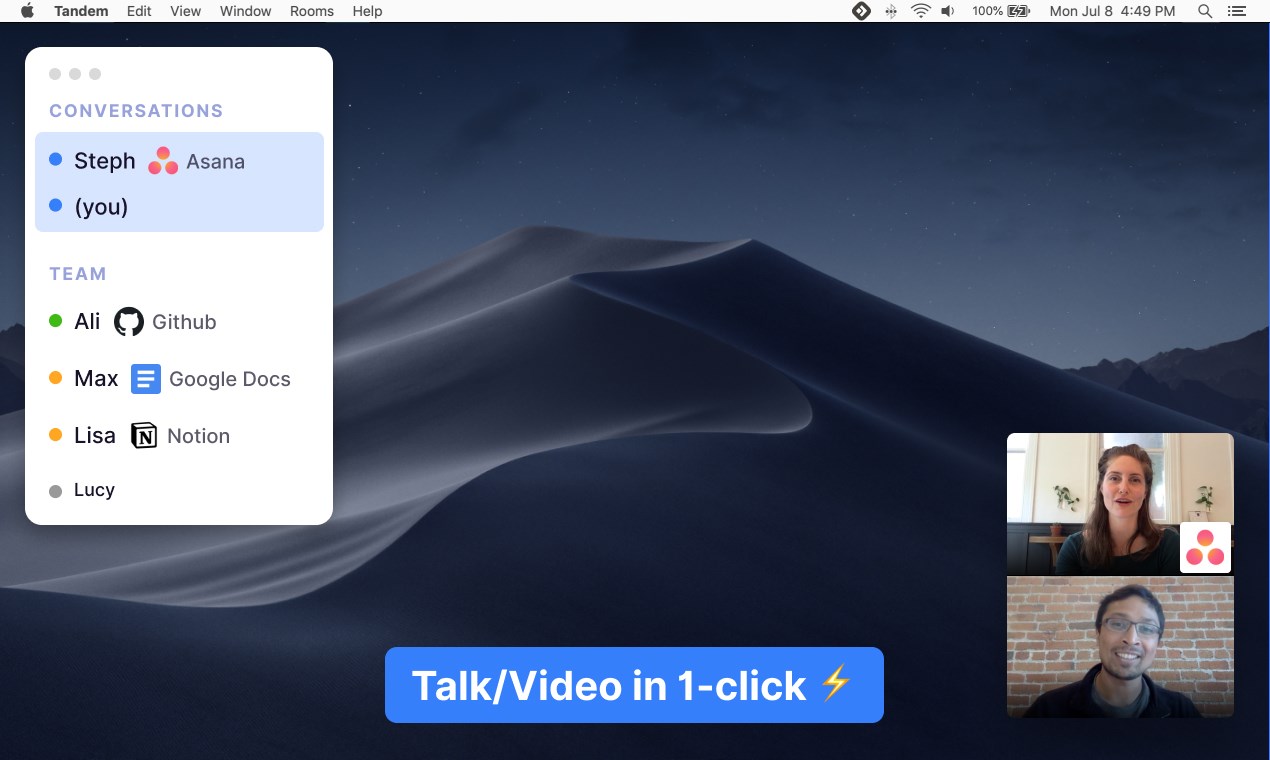
The remote working shift during lockdown was perfect timing for Tandem, a virtual workplace that was made for the remote revolution.
The platform was built out of the founding team’s own frustrations over an interrupted workflow, which prompted them to build their own virtual workplace prototype.
The startup was in fact fresh out of the Y Combinator accelerator last year, having raised a seed funding round to set the team up perfectly for a surge in customers during the pandemic.
The platform provides a video chatting facility, automatically updates the entire communication channel to show what the person is working on, and integrates with other desktop apps such as Google Docs, Trello, Github, and Notion.
Levels

For healthtech startup Levels, lockdown has left the team — which has been working remotely since the beginning — almost entirely unfazed.
“It has led to our company being able to proceed and thrive as if nothing without a misstep,” Levels co-founder and Chief Medical Officer Dr. Casey Means told The Sociable.
“Our systems were set up from the beginning to function effectively remotely, so this has been great,” she added, explaining that remote work lends itself to productivity among team members, who are spread across the U.S., Canada and Colombia.
With access to a whole host of communication apparatus, including G Suite, Slack, Notion, Figma, Whimsical, Zotero, and Notion, the team at Levels is able to keep on top of one of the company’s priorities: transparency and effective communication.
And as some businesses return to the office, Levels intends to remain remote-first.
“Remote work is a forcing-function for many extremely important business practices, like rigorous documentation of processes by each team member,” said Casey. “It also lends to more control and autonomy over one’s schedule,” which, she added, means that mental health can remain a priority.
Disclosure: This article includes clients of an ESPACIO portfolio company.












